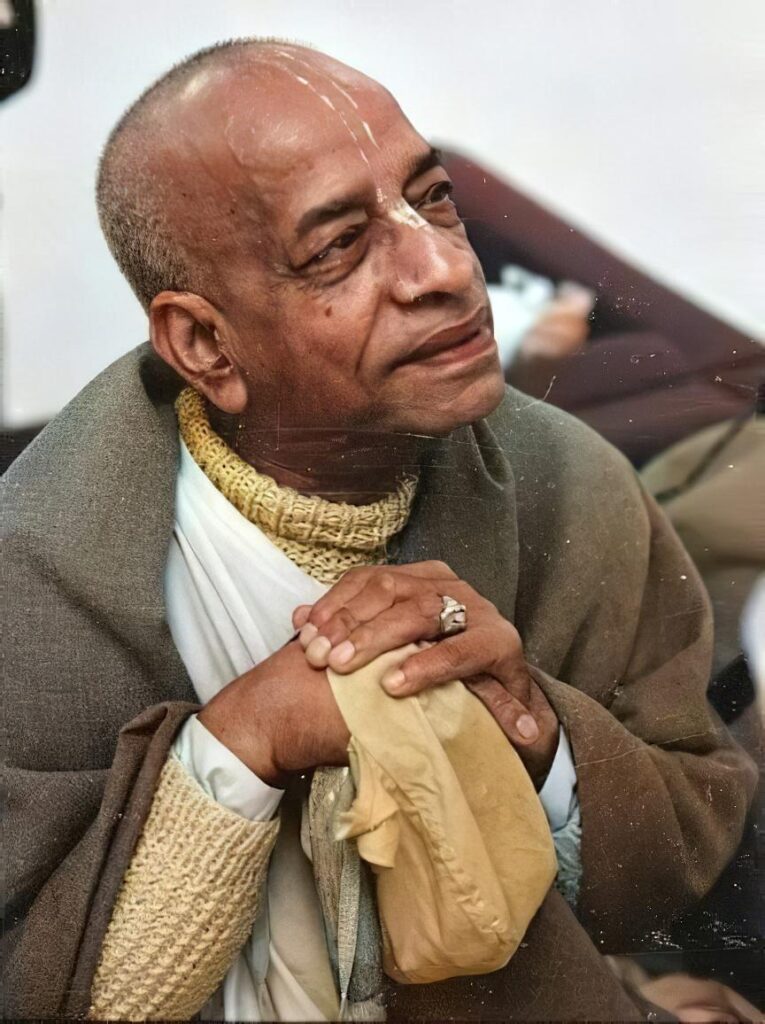How do we achieve transcendence? There are many processes offered in the Vedas, such as the study of the scriptures, the practice of Astanga Yoga, asceticism, the practice of renunciation, and so on. These different processes have the aim of elevating our consciousness up up to the transcendental stage, where we become free from all material contamination.
However, the Bhagavad-Gita explains that there is something higher than even liberation. In 18.54, for example, it’s mentioned: brahma-bhūtaḥ prasannātmā/ na śocati na kāṅkṣati/ samaḥ sarveṣu bhūteṣu/ mad-bhaktiṁ labhate parām: “One who is thus transcendentally situated at once realizes the Supreme Brahman and becomes fully joyful. He never laments or desires to have anything. He is equally disposed toward every living entity. In that state he attains pure devotional service unto Me.”

This verse explains the platform of brahma-bhūtaḥ, the platform of liberation, where one becomes transcendental to the influence of the three material modes and other material influences. When one reaches this platform, he becomes prasanna-ātmā, fully joyful and free from all types of lamentation. Sounds wonderful, but the Gita reveals that this is actually just the beginning of something higher, that is mat-bhaktim, transcendental devotional service to the Lord.
The practice of devotional service doesn’t demand a great show of complex material arrangements. Quite the opposite, it is a very simple process that just demands a little sincerity.
On Bg 18.65, Krsna mentions “Always think of Me, become My devotee, worship Me and offer your homage unto Me. Thus you will come to Me without fail. I promise you this because you are My very dear friend.”
On 9.26, however, an even simpler exemple is given: patraṁ puṣpaṁ phalaṁ toyaṁ/ yo me bhaktyā prayacchati/ tad ahaṁ bhakty-upahṛtam/ aśnāmi prayatātmanaḥ. “If one offers Me with love and devotion a leaf, a flower, a fruit or water, I will accept it.”
One may not have enough material assets to perform complex and expensive Vedic sacrifices, one may not have the peace of mind to practice meditation for extended periods of time, and not have enough intellectual power to study the Vedas in detail, but anyone can procure a little bit of clean water, a few flowers, fruits or leaves. By simply offering these things with devotion to the Lord, and thus attain the highest perfection, in an existence of life of eternity, bliss, and knowledge in one of the spiritual planets.
This sublime process is explained by Prabhupada in Bg 9.26: “The process of achieving such a marvelous result is very easy and can be attempted even by the poorest of the poor, without any kind of qualification. The only qualification required in this connection is to be a pure devotee of the Lord. It does not matter what one is or where one is situated. The process is so easy that even a leaf or a little water or fruit can be offered to the Supreme Lord in genuine love and the Lord will be pleased to accept it. No one, therefore, can be barred from Kṛṣṇa consciousness, because it is so easy and universal. Who is such a fool that he does not want to be Kṛṣṇa conscious by this simple method and thus attain the highest perfectional life of eternity, bliss and knowledge? Kṛṣṇa wants only loving service and nothing more.”
This simple process of worship is much more advanced than it may sound at first. To offer flowers or fruits to Krsna with devotion, one has to first understand the fact that God has a personal form, something that is explained in many passages of the Vedas, but that not all can understand. God can be understood in three levels: Brahman (as a transcendental unlimited, impersonal light), Paramatma (as the localized Supreme Spirit, present everywhere), and finally as Bhagavam (the Supreme Personality of Godhead). In the first level, one accepts the existence of a superior force but understands it has no form. In Paramatma realization, one understands that God has a form, but there is no relationship. Only in the Bhagavam aspect is God properly understood, being a Person and performing transcendental activities. When one reaches this stage, there is finally the possibility of offering service to the Lord, service that the Lord happily reciprocates. “Only the devotee, who accepts Kṛṣṇa as He describes Himself, without interpretation, can understand that the Supreme Absolute Truth can eat food and enjoy it.”
Krsna is not hungry. He does not depend on one offering Him something to eat. On the opposite, He is the proprietor of everything. However, when one offers something to Him with devotion, He gladly accepts it. The important is not the offering (which can be even the simplest thing, as indicated in the verse), but the devotional sentiment it is offered. This sentiment allows one to establish a loving relationship with the Lord, which is the essence of the process of Bhakti.
